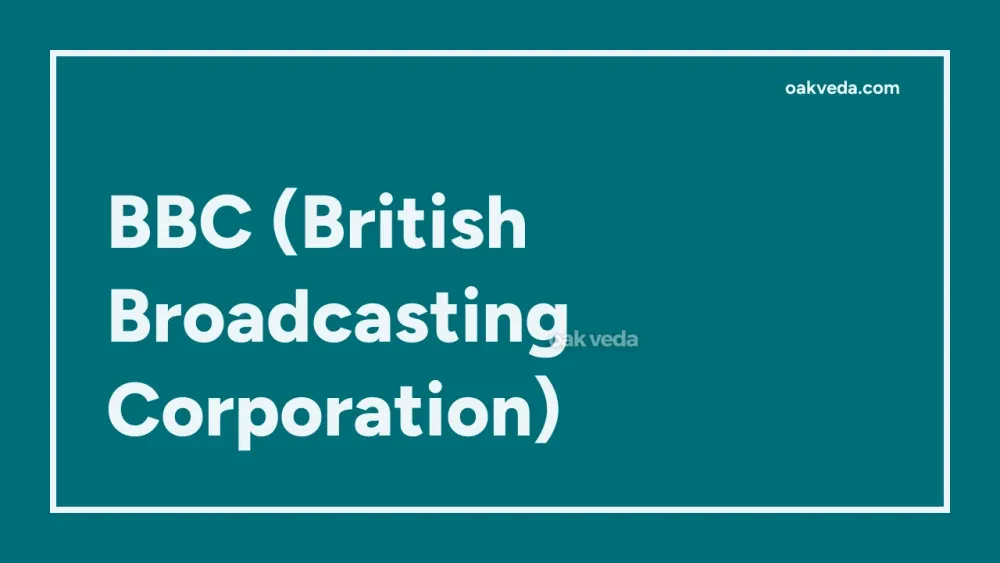
What is the Full Form of BBC?
The full form of BBC is British Broadcasting Corporation. As one of the world's most renowned public service broadcasters, the BBC has been a cornerstone of British media and culture for nearly a century.
What is British Broadcasting Corporation?
The British Broadcasting Corporation, commonly known as the BBC, is the United Kingdom's national broadcaster. It operates under a Royal Charter and is primarily funded by an annual television license fee paid by British households. The BBC produces and distributes a wide range of content across television, radio, and digital platforms, serving audiences both in the UK and internationally.
Origin and Development of British Broadcasting Corporation
The BBC's journey began in 1922, marking a significant milestone in broadcasting history:
- 1922: The British Broadcasting Company was founded by a group of wireless manufacturers.
- 1927: The company was granted a Royal Charter and became the British Broadcasting Corporation.
- 1936: The BBC launched its television service, pioneering TV broadcasting in the UK.
- 1953: The coronation of Queen Elizabeth II was broadcast, boosting television's popularity.
- 1967: BBC Radio 1 was launched, expanding the corporation's radio offerings.
- 1997: BBC Online (bbc.co.uk) was introduced, establishing the BBC's digital presence.
- 2007: BBC iPlayer was launched, revolutionizing on-demand viewing.
Throughout its history, the BBC has adapted to technological advancements and changing audience needs, maintaining its position as a leading global broadcaster.
How does British Broadcasting Corporation work?
The BBC operates through a complex structure designed to fulfill its public service mission:
- Governance: The BBC Board oversees the corporation's activities, ensuring it meets its obligations.
- Funding: Primarily funded by the TV license fee, with additional income from commercial activities.
- Content Production: In-house production teams and external commissions create diverse content.
- Distribution: Content is delivered through various platforms, including TV, radio, and digital services.
- Global Operations: BBC World Service and BBC Studios extend the corporation's reach internationally.
Types of BBC Services
The BBC offers a wide range of services catering to diverse audiences:
- Television: Multiple channels including BBC One, BBC Two, BBC Three, and BBC Four.
- Radio: National and local radio stations covering various genres and interests.
- Digital: BBC iPlayer, BBC Sounds, and bbc.com provide on-demand and online content.
- News: BBC News operates across multiple platforms, delivering 24/7 coverage.
- World Service: International broadcasting in multiple languages.
Functions of British Broadcasting Corporation
The BBC's core functions align with its public service remit:
- Inform: Providing impartial news and current affairs coverage.
- Educate: Offering educational content across various subjects and age groups.
- Entertain: Producing high-quality drama, comedy, and entertainment programs.
- Cultural Representation: Reflecting the diversity of the UK and promoting British culture globally.
- Innovation: Pioneering new broadcasting technologies and formats.
Applications of British Broadcasting Corporation
The BBC's influence extends beyond traditional broadcasting:
- Digital Innovation: Developing cutting-edge platforms like BBC iPlayer and BBC Sounds.
- Global News Coverage: Providing trusted news reporting worldwide.
- Educational Resources: Offering materials for students and lifelong learners.
- Cultural Diplomacy: Promoting British culture and values internationally.
- Technological Advancements: Contributing to broadcast technology development.
Features of British Broadcasting Corporation
Key features that define the BBC include:
- Editorial Independence: Maintaining impartiality in news and current affairs.
- Quality Programming: Producing award-winning content across genres.
- Universal Access: Ensuring services are available to all UK residents.
- Commercial-Free Broadcasting: Domestic services without advertising.
- Diverse Content: Catering to various interests, age groups, and communities.
Benefits of British Broadcasting Corporation
The BBC offers numerous benefits to its audience and society:
- Trusted Information Source: Providing reliable news and analysis.
- Cultural Enrichment: Offering diverse, high-quality programming.
- Educational Value: Supporting learning for all ages.
- National Unity: Fostering shared experiences and cultural moments.
- Global Reputation: Enhancing the UK's soft power and international influence.
Limitations or Challenges of British Broadcasting Corporation
Despite its strengths, the BBC faces several challenges:
- Funding Pressures: Debates over the license fee model and funding cuts.
- Political Scrutiny: Maintaining impartiality amid increased political polarization.
- Competition: Adapting to the rise of streaming services and digital platforms.
- Demographic Shifts: Engaging younger audiences in a changing media landscape.
- Technological Disruption: Keeping pace with rapid technological advancements.
Future Developments in BBC Technology
The BBC continues to innovate and adapt for the future:
- AI and Personalization: Enhancing content recommendations and user experience.
- 5G Broadcasting: Exploring new distribution methods for high-quality content.
- Virtual and Augmented Reality: Developing immersive storytelling experiences.
- Voice-Activated Services: Expanding accessibility through smart speakers and devices.
- Sustainable Production: Implementing eco-friendly broadcasting technologies.
FAQs on BBC Full Form
-
What does BBC stand for? BBC stands for British Broadcasting Corporation.
-
When was the BBC founded? The BBC was founded in 1922 as the British Broadcasting Company and became the British Broadcasting Corporation in 1927.
-
How is the BBC funded? The BBC is primarily funded by the TV license fee paid by UK households, supplemented by commercial activities.
-
Is the BBC available outside the UK? Yes, the BBC World Service and BBC Studios distribute content globally, while BBC iPlayer is available in the UK.
-
What is the BBC's mission? The BBC's mission is to inform, educate, and entertain audiences through high-quality, impartial, and innovative content.
You may be interested in:
- TT (Tetanus Toxoid): Full Form and Importance
- PNB (Punjab National Bank): Full Form and Overview
- BA (Bachelor of Arts): Full Form and Comprehensive Guide
- SWIFT (Society for Worldwide Interbank Financial Telecommunications)
- APEC (Asia-Pacific Economic Cooperation)
- BOC (Bank of Ceylon): Full Form and Overview

